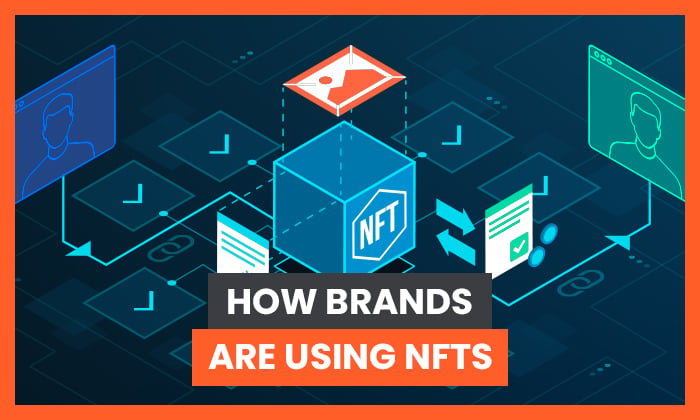
Technology has been advancing at warp speed in the past few years.
One area that has been enjoying some of the most rapid advancements is blockchain.
That doesn’t mean solely cryptocurrencies like Bitcoin, Ethereum, and the slew of other cryptos being peddled on the crypto market.
Let’s look at non-fungible tokens (NFTs) and how brands can use NFTs in their marketing campaigns.
What Are NFTs?
While they’ve been around for a couple of years, NFTs have recently become a hot topic (and even hotter investment).
What are they, and how do they work?
To understand non-fungible tokens (NFTs), we must first define the word “fungible.”
If something is fungible, it can be exchanged for something of equal or similar value. A typical example would be fiat currency (and even cryptocurrency). It’s fungible because you can trade it for goods of an equal value. You can also trade it for another currency if need be.
On the other hand, something that’s non-fungible is unique and therefore can’t be exchanged at equivalency. For example, a diamond is non-fungible as no two diamonds in the world are alike, and thus each has its unique value. You can’t trade one for another at equivalency.
A non-fungible token is a cryptographic asset created using blockchain technology.
What sets NFTs apart from cryptocurrencies (which are fungible tokens as they are identical to each other) is that they have unique identification codes and metadata to distinguish one NFT from another.
Because each NFT is unique, it cannot be traded or exchanged at equivalency with another NFT. The result is that each NFT is a digital collectible, a one-of-a-kind asset that can’t be replicated.
That’s where the craze for NFTs started. In 2017, CryptoKitties, a blend between Tamagotchi and trading cards, exploded onto the scene. Each kitten is unique and can be raised, reproduced, be traded— some for as much as $140,000.
NFT mania was born, and today, the interest in NFTs is only increasing.
Why Are Non-Fungible Tokens (NFTs) Important to Brands?
One of the main reasons NFTs are important to brands is that they can be used to represent digital files, such as art, audio, and video. They are so versatile, they can be used to represent other forms of creative work like virtual real estate, virtual worlds, fashion, and much more.
What does this have to with your brand and marketing strategy?
Thanks to the global interest they’ve generated, NFTs have opened up new ways of brand storytelling and consumer interaction, which, as you know, are the two main pillars of an effective marketing strategy.
With NFTs, you can:
- create unique brand experiences
- increase brand awareness
- encourage interaction
- create interest in your brand and product
Ultimately, NFTs can help you increase conversions and drive revenue.
Here are ways brands are using NFTs to power their marketing.
6 Ways Brands Are Using NFTs
The concept of NFTs in marketing may be a bit difficult to grasp. Like most things that are difficult to understand, the best way is to look at examples.
Here are some nifty ways brands are using NFTs. Hopefully, you’ll get some inspiration from them.
1. Taco Bell GIFs
Research shows that 83 percent of millennials prefer to do business with brands that align with their values. That’s why brands need to support causes they believe in openly (and genuinely).
While Taco Bell has been doing this for years through their foundation, they took it to a whole new level by selling taco-themed NFT GIFs to support the Live Más Scholarship.
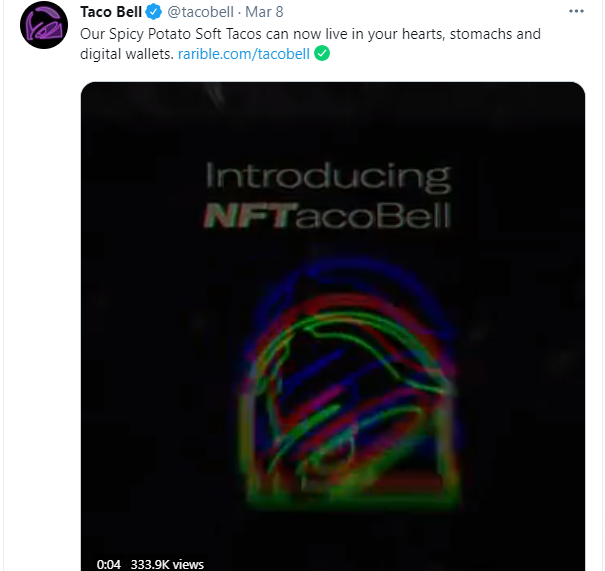
Within 30 minutes of putting their 25 NFTs (dubbed NFTacoBells) up for sale on Rarible (an NFT marketplace), all the GIFs were gone. Each GIF started at a bidding price of $1. However, they all sold for thousands of dollars each, with one going for as much as $3,646.
Creating and selling NFTs was a clever move on Taco Bell’s part as it generated a lot of buzz on mainstream media and social media; that’s always good for business.
Like Taco Bell, you can use NFTs to kill two birds with one stone:
- drive brand awareness
- support a good cause
Both are potent factors that can help drum up business for your brand.
2. RTFKT Digital Sneakers
Looking for a way to disrupt the market and make a name for yourself?
NFTs can help you do that.
That’s what happened when a little-known Chinese virtual sneaker brand called RTFKT designed an NFT sneaker for the Chinese New Year and put it up for auction.
The sneaker sold for a whopping $28,000.
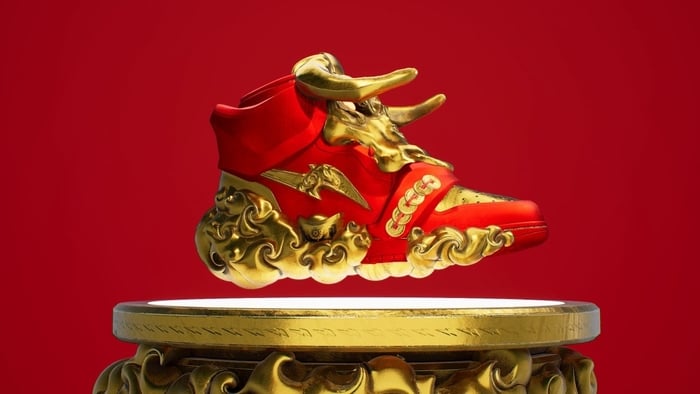
That’s quite impressive for a brand that’s barely two years old, especially considering they sold a sneaker that can’t be touched, let alone worn. Impressive as this was, it was still way behind the $3 million they generated from another NFT sneaker they designed in collaboration with the 18-year-old artist, FEWOCiOUS.
With NFTs still in their infancy, this is the right time for marketers to join the bandwagon. It’s a great way to grab attention and build a tribe of followers.
As a marketer thinking of ways to leverage NFT technology, you can take a cue from RTFKT. Create limited memorabilia to celebrate special milestones and holidays, and use them in your marketing campaigns around those holiday seasons. You can give them away to the first X number of customers or even auction them off as stand-alone products.
3. Grimes Videos
Six million dollars in 20 minutes.
That’s how much Grimes made from a collection of 10 NFTs auctioned on Nifty Gateway.
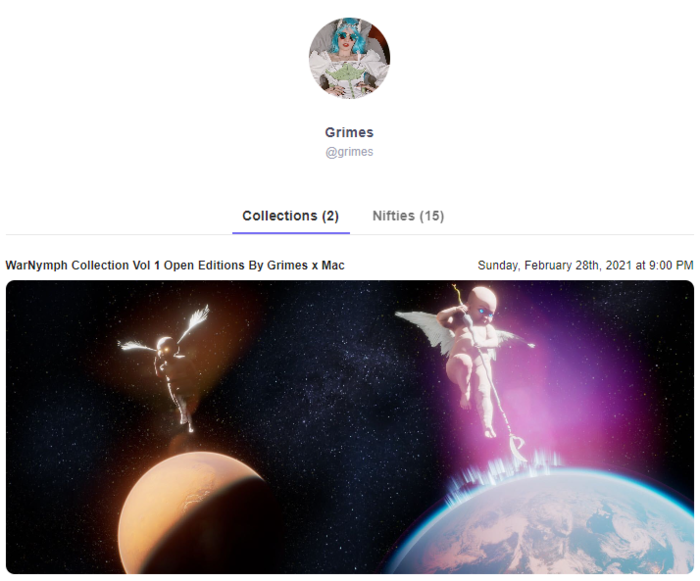
It’s clear that people are interested in NFTs, and brands can leverage that interest to market their products. For example, you can:
- Partner with artists or auction sites and have your brand present in the auction.
- Create an NFT and auction it for charity.
- Run a contest (for lead generation) with NFTs being the prize.
Marketing is all about riding current trends and using your creativity to harness the excitement around them to draw attention to your brand.
4. Kings of Leon ‘When You See Yourself’ Album Launch
With so many musicians and bands around, the music industry has become very competitive. Building and keeping a loyal fanbase isn’t as easy as it used to be.
The Kings of Leon found a way to get around that.
They released their album, “When You See Yourself” in the form of an NFT.
The Kings of Leon are using three types of tokens for this first-of-its-kind album release. One type features a special album package, while the second offers live show perks. The third type of token features exclusive audiovisual art.
While the album is available on all music platforms, the NFT version was only available on YellowHeart, priced at $50.

The sale of the NFTs was only open for two weeks, after which no more album tokens were created. This move made the tokens a tradeable collectible.
Being the first band to release an NFT version of an album put the Kings of Leon in the history books.
More than that, it put them in the hearts of their fans by allowing them to own a digital collectible. Now that’s an excellent way of fostering brand loyalty.
5. Beeple Artwork
Virtually unknown in mainstream art circles, Mike Winkelmann has become something of a legend.
He sold a JPG file for $69.3 million, making him the third-most-expensive living artist at the time of the auction.
The file is a piece of art sold as a non-fungible token and is the first digital-only NFT auctioned by Christie’s.
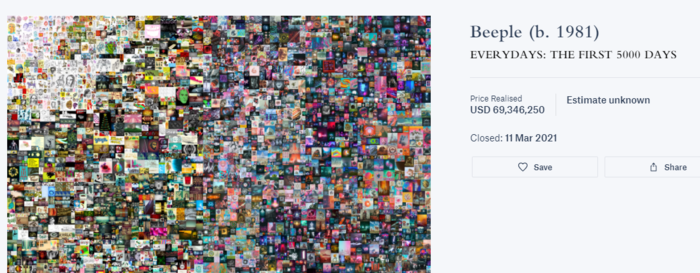
The two-week timed auction had to be extended by 90 seconds as a flurry of bids came in when the auction was about to close.
What lessons can brands learn from this?
Be quick to embrace new technologies and ideas. With the competition becoming more fierce with each passing day, you must be willing to take risks and be disruptive to outperform.
6. Nyan Cat GIF
A decade ago, the Nyan Cat GIF burst onto the digital scene with a colorful bang. Creator Chris Torres made an NFT version of the GIF that sold for over $500,000 on the crypto auction site, Foundation.
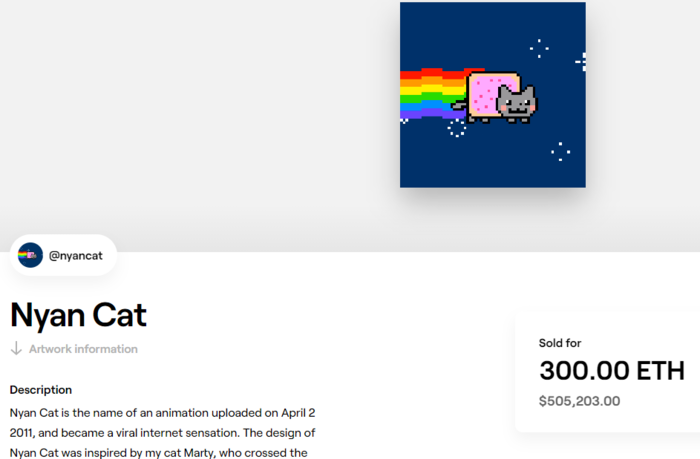
That’s right. An animated GIF from the past sold for over half a million dollars.
Chris, however, didn’t stop there. He organized an auction where classic memes are being auctioned off as NFTs. One of the memes, Bad Luck Brian, sold for over $34,000 on Foundation.
What can brands take away from this?
The lesson here is that your customers are willing to pay for great experiences. Capitalize on this by turning some of your best ads into NFTs. Create an event where you auction them off and make sure to publicize the event well.
Not only will this boost your brand awareness, but it will also help you reach new audiences in the tech space.
The Future of NFTs
Sure, NFTs are still relatively new, and their practical use is still limited. However, people love them and are willing to spend on them. These are sure indicators that they’re here to stay.
Like blockchain technology powering them, NFTs could play a significant role in the digital landscape of the future. That’s particularly true for marketers as non-fungible tokens have opened up new avenues for interacting with your audience and creating memorable experiences for them.
Remember, most common technologies we use today (like social media) seemed like fads when they started.
Yet today, we depend on them for so many things in life. NFTs may seem like a craze today, but they bring to the table a lot of beneficial features (like transparency coupled with security) that break the limitations of current technologies we’re using.
Conclusion
NFTs are fantastic in creating memorable experiences for your customers. They’re also an excellent way of engaging with and interacting with your target audience.
While the technology is still in its infancy, brands need to pay close attention to it. More specifically, you need to research ways you can leverage NFTs in your marketing strategies. For example, you can mint luxury designs of your product, create memorable ad campaigns, or collaborate with NFT creators.
The bottom line is that NFT technology is here to stay, and it’s undoubtedly set to be a part of digital marketing.
Are NFTs a fad? Or are they here to stay?
via https://AiUpNow.com April 1, 2021 at 05:42PM by Neil Patel, Khareem Sudlow,
